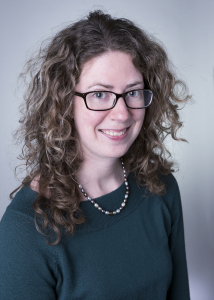Do You Evaluate Other People Impartially? Probably Not.
 February 22, 2019
February 22, 2019
Abeer Pamuk | Graduate School of Arts and Sciences
Brittany Cassidy, PhD ’14, is interested in how we observe and evaluate others in our daily encounters. Her work across disciplines combines social psychology with neuroscientific approaches in the field known as social neuroscience. Earlier this year, the Association for Psychological Science recognized Cassidy as a Rising Star.
Cassidy was drawn to Brandeis “because of the unique interdisciplinary interests of the faculty and the size of the program. My ideal program was one where it felt like everyone knew each other, and where I would be exposed to a lot of different kinds of research,” she says. “The size of the Brandeis program really facilitated that.”
Cassidy’s research focuses on “person perception,” the study of how we process information about the people we encounter. We employ person perception in every social interaction. For instance, when we observe other people, we spontaneously make personality inferences based on appearance (e.g. that person looks trustworthy, and so must be trustworthy) and behaviors (e.g. that behavior demonstrates trustworthiness). “We often do this without even thinking about it,” says Cassidy.
One example of person perception in action is how young and old people perceive faces differently. We tend to perceive older adults as being more trustworthy than younger adults. Younger people are also more likely to develop negative impressions towards untrustworthy faces than older adults. This phenomenon contributes to older adults becoming excessively positive in their impressions of faces. Some of Cassidy’s findings also show that when a person looks trustworthy but behaves in an untrustworthy way, the memory of the untrustworthy behavior diminishes. These types of observations and evaluations are important because “people often outwardly state that they are non-biased and do not judge people based on looks or the social groups to which they belong,” but “the data suggest that this does not seem to be the case.”
Throughout her five years at Brandeis, Cassidy had a lot of freedom to develop her research and gain new perspectives within the psychology program, which regularly brought interesting researchers to give talks. “Because of the size of the department, all the graduate students would attend each talk,” she says. “This really exposed me to research and techniques that I might not have considered otherwise.”
Cassidy also benefitted from the field-leading faculty at Brandeis during her time as a graduate student. “My PhD advisor, Dr. Angela Gutchess, was fantastic and had a large impact on how I conduct research and think about research questions,” she says. “Angela continues to be a mentor to me and provides me with a lot of great advice in terms of navigating through my career.” She also cites Leslie Zebrowitz as a mentor in the department. “A lot of Leslie’s work has been on how people form impressions from appearances. Because I was interested in that work as well, Leslie was totally open to collaborating on projects and giving advice as I developed experiments. I definitely appreciated (probably more now in retrospect) my luck in having Leslie be so open to collaborating with me, and how open Angela also was to the possibility.”
After graduating from Brandeis, Cassidy completed a postdoctoral fellowship at Indiana University, where she worked with Anne Krendl on social neuroscience research. She wanted to continue in academia and wanted additional experience before going out on the academic job market. After the fellowship, she was employed by UNC Greensboro as an assistant professor. She has established the Social Cognition Lab at UNC to continue her work on person perception. In her lab, several different methods are used, including behavioral experiments, eye-tracking, and fMRI, to gain a better understanding of how people perceive, evaluate, and remember other people over their adult lifespan. “I’m very excited to see the lab grow in the next few years and learn about all the new ideas the incoming students will have,” she says.
For students interested in psychology, Cassidy has one piece of advice—join a lab. “As an undergrad, I enjoyed learning about social psychology research (meaning—reading the findings), but never fully appreciated the work that went into designing and running an experiment and analyzing data until I joined a lab. The research process can be tough, so learning if you’re still driven to ask and answer questions regardless of the setbacks is important when deciding if you want to pursue a career in research.”






